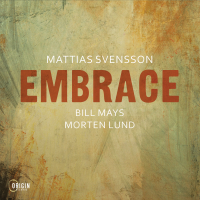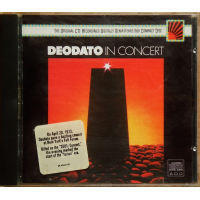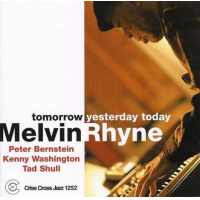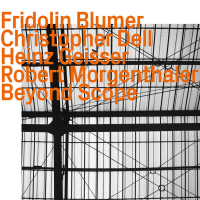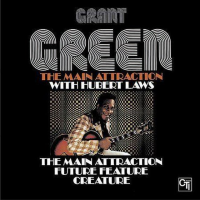Home » Jazz Articles » Liner Notes » Dewa Budjana: Joged Kahyangan
Dewa Budjana: Joged Kahyangan
But while Budjana continues to make big selling pop music with Gigi—at last count over 20 recordings since 1994—his own recordings have reflected a more decidedly jazz-centric disposition, albeit oftentimes heavily influence by both the traditional music of Indonesia and the spirituality of his Hindu faith. "Dang Hyang Story," Joged Kahyangan's third track, was, in fact, inspired by the story of Danghyang Niratha, who brought Hinduism from India to Indonesia, and remains, for Indonesian Hindus, the equivalent of Islam's Mohammed. Even the album title means "Dancing Heaven," or "Dancing Nirvana."
Budjana's music may reflect his faith, but on Joged Kahyangan it's less overt than on previous albums, including the four albums released by the guitarist prior to signing with MoonJune, beginning with 1997's Nusa Damai. With an all-American cast that includes keyboardists Larry Goldings (John Scofield, James Taylor), saxophonist Bob Mintzer (Yellowjackets), bassist Jimmy Johnson (Allan Holdsworth, James Taylor) and, most notably, drummer Peter Erskine (Weather Report, Bass Desires), Budjana has made an album heavy on lyricism and his illustrious companions' nothing-to-prove improvisational acumen, though there's no shortage of stellar playing across Joged Kahyangan's fifty-minute, eight-track program.
Budjana first came to the United States to make a solo record in 2002. "When Gigi took a six-month break in 2002, I came to Santa Cruz in California and started sending emails to Peter Erskine, Airto Moreira, Felix Pastorius and others," Budjana explains. "I wanted to make my third album in America. Only Peter replied to my emails, saying 'Please send me your demo and we can talk after that.' After I sent him my demo, Peter replied, suggesting the bassist (the late Dave Carpenter) and what studio to use. After that, Peter was very helpful with my project. We recorded in 2002 at Peter's studio in Santa Monica; it was just a trio record, and was a lot of fun."
That recording, Samsara, was released in 2003, and would lead to a second trio recording, 2005's Home, where Budjana was once again accompanied by Erskine, but with the bass chair shared by Carpenter and Reggie Hamilton. A six-year break separated Home and Dewai in Paradise (Strings in Paradise), a larger-cast affair—where Erskine and Carpenter were joined by Bela Fleck harmonicist Howard Levy, as well as keyboardist/producer Indra Lesmana and 20 other Indonesian musicians—redolent of both the guitarist's love of American jazz attitude and his own cultural roots.
Joged Kahyangan may largely dispense with overt indications of Budjana's native roots, but there's another even more important differentiator: the album was recorded in a single day, with no prior rehearsals. Most of the songs were second or third takes, with the first take acting as the only rehearsal for the group, making Joged Kahyangan as close to a live album as Budjana has made to date, though he has released two live DVDs in Indonesia. What's most surprising is how well his musical partners navigate Budjana's charts; not unlike American guitarist Pat Metheny, despite an overall ambience that feels easy and accessible, Budjana's music reveals far greater depth under the hood.
"Foggy Cloud"—written, says Budjana, "in the East Javanese Mountains, where I played at a hotel on Mount Bromo"—opens Joged Kahyangan on a lighter note, though its singable melody is bolstered by some changes that might well make musicians—even of Erskine, Johnson, Goldings and Mintzer's caliber—break no small sweat. Budjana's clean tone ultimately turns gritty for Mintzer's tenor feature, his arpeggiated support reminiscent of early '70s Mahavishnu Orchestra, though when the guitarist finally takes his first solo of the set—a mind-boggling mélange of melodic focus and irrepressibly vital legato lines—he reveals a more finessed approach.
It's an approach that's equally evident on the title track, where Budjana's acoustic guitar work is crisply articulated, delivering a serpentine melody in tandem with Mintzer, this time on bass clarinet. Erskine and Johnson are the epitome of tasteful support, the drummer largely driving its first couple of minutes with nothing more than soft cymbals and barely audible rim shots. Erskine's lineage may include more chops-heavy playing with big band legend Stan Kenton and influential fusion supergroup Weather Report, but here (as always), he makes the same perfect choices as Johnson; anything more would be too much, anything less, not enough.
It may be a guitarist's record, but Budjana's restraint and respect for space is something that's not just been fundamental to him since discovering Germany's renowned ECM label in his early teens, but also reflects his faith and culture. "In India, they have Divali as a festival of light, but in Bali we have Nyepi Day (Silent Day)," the guitarist explains. "This is the one and only silence celebration on earth. We stop doing everything for one day: no talk, no food, no work, no light, no activity at all. The Island shuts down for 24 hours—even the International airport is closed. I got my inspiration to write 'Caka 1922,' on Dawai in Paradise, from Nyepi Day.
"In Hindu, we know about meditation and yoga, and ECM's music is very meditative," Budjana continues. "That's why I love the music from ECM Records. They're not only about technique or speed on any instrument, but the exploration of sound and harmony as contemplative global music."
There's little of Joged Kahyangan that would fit stylistically on an ECM recording (though Moonjune and Budjana hope to record the guitarist with some of his ECM heroes in 2014). Still, while much of the album occupies a contemporary fusion space, the entire group's approach—where the songs drive the playing, not the other way around—distances Joged Kahyangan from any suggestion of superfluous pyrotechnics. "As You Leave My Nest," another tune featuring Budjana's spare and tasty acoustic work, is the album's lone vocal feature for Janis Siegel, who fits into the purview of Budjana's group hand-in-glove, her interpretive skills demonstrating care-driven restraint, even as she navigates a melody that may well be singable, but not without challenging the longtime The Manhattan Transfer singer.
"Majik Blue"—dedicated to Budjana's Majik Blue Parker guitar—may begin with an easygoing groove and a melody based on a harmonically shifting, three-note motif played by Mintzer on soprano saxophone, but takes an unexpected turn into darker territory midway. A series of arpeggios based on open guitar strings lead to a thundering riff and, while still staying true to its motivic nature, a series of impressive solos for everyone but Erskine.
"Erskoman"—Erskine's nickname—was written specifically for the drummer, who has been a great facilitator in helping Budjana achieve his recent goals. "Once I got the attention of Peter Erskine, everything else opened up for me with other players," says Budjana, gratefully. Like "As You Leave My Nest," a trio track where Mintzer and Johnson sit out, here Goldings demonstrates why he's in such high demand as a triple-threat organist who carries accompaniment, bass lines and solos simultaneously and with effortless aplomb, while Erskine heats things up to propel Budjana's overdriven and harmonized solo to its logical conclusion.
"Guru Mandala" is the closest thing to funk though, with its eastern-tinged and near-anthemic melody, it's not hard to imagine Budjana bringing Indonesian instruments like bamboo flutes and metallaophones into the mix. Still, with this American group it's the jazz vernacular that ultimately defines this version.
Budjana's refined acoustic guitar, Erskine's soft brushes and Goldings' idyllic organ timbres on "Borra's Ballad"—an instrumental trio version of "As You Leave My Nest" that's also the recording's only first take—bring the album to a gentle, elegant close. "Unexpected things happen when Peter plays my tunes, and that's his signature," says Budjana, but the same can be said about everyone involved in the making of Joged Kahyangan, an album that reveals a guitarist and composer whose Indonesian fame may well be about to go global. With more Moonjune recordings on the horizon and the possibility of taking his American friends on the road for the first time in 2014, Dewa Budjana's name is rightfully on the ascendance and his career on an equally upward trajectory.
Liner Notes copyright © 2026 John Kelman.
Joged Kahyangan can be purchased here.
Contact John Kelman at All About Jazz.
With the realization that there will always be more music coming at him than he can keep up with, John wonders why anyone would think that jazz is dead or dying.
Track Listing
Foggy Cloud; Joged Kahyangan; Dang Hyang Story; As You Leave My Nest; Majik Blue; Erskoman; Guru Mandala; Borra’s Ballad.
Personnel
Dewa Budjana
guitar, electricLarry Goldings
organ, Hammond B3Bob Mintzer
saxophoneJimmy Johnson
bassPeter Erskine
drumsJanis Siegel
vocalsAdditional Instrumentation
Dewa Budjana: guitar, synth guitar; Larry Goldings: Hammond organ, acoustic piano; Bob Mintzer: tenor and soprano saxophone, clarinet, bass clarinet; Jimmy Johnson: bass guitar; Peter Erskine: drums; Janis Siegal: vocal (4).
Album information
Title: Joged Kahyangan | Year Released: 2014 | Record Label: Moonjune Records
Tags
PREVIOUS / NEXT
Support All About Jazz
 All About Jazz has been a pillar of jazz since 1995, championing it as an art form and, more importantly, supporting the musicians who make it. Our enduring commitment has made "AAJ" one of the most culturally important websites of its kind, read by hundreds of thousands of fans, musicians and industry figures every month.
All About Jazz has been a pillar of jazz since 1995, championing it as an art form and, more importantly, supporting the musicians who make it. Our enduring commitment has made "AAJ" one of the most culturally important websites of its kind, read by hundreds of thousands of fans, musicians and industry figures every month.














